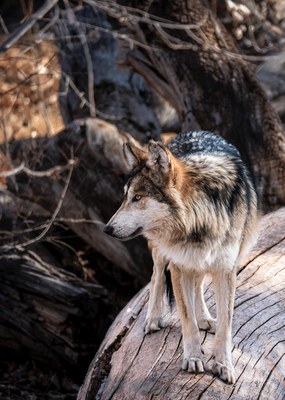Mexican Wolf Conservation Facility
In the second half of 2025, the ABQ BioPark plans to open a new behind-the-scenes care facility to support one of our region's most iconic and endangered animals: the Mexican gray wolf.
 The Mexican Wolf Conservation Facility will be a 4.5 acre area located on ABQ BioPark Botanic Garden property along the bosque.
The Mexican Wolf Conservation Facility will be a 4.5 acre area located on ABQ BioPark Botanic Garden property along the bosque.
The facility will help us save these animals from extinction. This new space will provide expert care, rehabilitation, and temporary housing for the wolves.
The Mexican gray wolf was once common in the Southwest. By the 1970s, humans pushed the native species to the brink of extinction. However, due to a joint conservation and reintroduction effort by the U.S. Fish and Wildlife Service and partners like the ABQ BioPark, the wild population has rebounded to an estimated 250 wolves as of 2025.
The new facility is secure and reasonably isolated, while still allowing the BioPark’s animal care staff to monitor them. This helps ensure that any wolves treated here will remain wild and not become accustomed to human contact.
Neighbors to the bosque are already accustomed to occasionally hearing the sound of coyotes during the evening. Now, they might even get to hear an occasional wolf howling in the night as well! Even though the wolves are present, there is no danger to local wildlife or nearby pets. The facility is secure, professionally staffed, and designed with the utmost attention to safety—for both the animals in our care and our surrounding community.
The facility is about care, not display. This is not a public habitat that BioPark guests can visit or view. This is a working conservation space focused on the breeding, recovery, and rehabilitation of a native species pushed to the brink of extinction by humans and is now slowly recovering thanks to human-led conservation efforts.
Before fully opening, we are excited to share this amazing conservation facility with our BioPark neighbors. While this space won’t be open to the public, we’re planning a special private tour for our neighbors later this summer. There, area neighbors can join us to meet the team, learn more about the wolves' care, and see how our neighborhood is playing a powerful role in helping a species recover.
